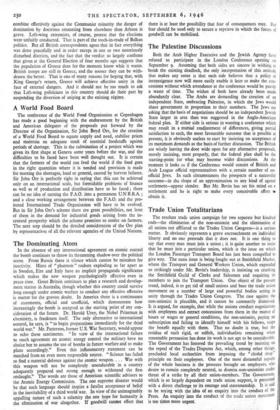Trade Union Totalitarians
The resolute trade union campaign for two separate but kindred ends—the elimination of the non-unionist and the elimination of all unions not affiliated to the Trades Union Congress—is a serious matter. It obviously represents a grave encroachment on individual liberty and no one pretends that it does not. It is one thing to say that every man must join a union ; it is quite another to insist that he must join a particular union, which is the issue on which the London Passenger Transport Board has just been compelled to give way. The same issue is being fought out at Smithfield Market, where- the Transport and General Workers Union, which expanded so strikingly under Mr. Bevin's leadership, is insisting on crushing the Smithfield Guild of Clerks and Salesmen and requiring its members to join the Transport Union. One object of the present trend, indeed, is to get rid of small unions and base the trade union movement on a number of large and powerful bodies acting in unity through the Trades Union Congress. The case against the non-unionist is plausible, and it cannot be summarily dismissed. It is argued, for example, that while the unions conduct negotiations with employers and extract concessions from them in the matter of hours or wages or general conditions, the non-unionist, paying no subscription and failing to identify himself with his fellows, reaps the benefit equally with them. That no doubt is true, but the residue of such rigid, or selfish, individualists remaining when reasonable persuasion has done its work is not apt to be considerable. The Government has fostered the prevailing trend by insisting on the repeal of the Trades Disputes Act, which, among other things, precluded local authorities from imposing the "closed shop" principle on their employees. One of the most distasteful aspects of the whole business is the pressure brought on employers, who desire to remain completely neutral, to dismiss non-unionists under threat of a strike by all their union-members. The Government, which is so largely dependent on trade union support, is presented with a direct challenge to its courage and statesmanship. It is said to be toying with the idea of an enquiry into the conduct of the Press. An enquiry into the conduct of the trade union movement is ten tithes more urgent.


























 Previous page
Previous page